Responsible materials sourcing From mapping our supply chain and assessing risk, to conducting independent, third-party audits, engaging with civil society and industry, and investing heavily in innovation, upholding standards in the sourcing of materials is a responsibility that requires a strategic, comprehensive approach. As we make progress toward our goal to use only recycled and renewable minerals and materials in our products and packaging, we continue to source primary materials — including tin, tantalum, tungsten, and gold (3TG), and other minerals, such as cobalt — responsibly, while working to improve conditions in and around mining communities. Our Responsible Sourcing of Materials Standard, part of our Code and Standards, covers all primary and recycled materials, including advanced and bio-based materials. Our standard aligns with leading international standards, including the United Nations Guiding Principles on Business and Human Rights and the Organisation for Economic Co-operation and Development’s Due Diligence Guidance for Responsible Supply Chains of Minerals from Conflict-Affected and High-Risk Areas (OECD Due Diligence Guidance). Every year, as part of our commitment to transparency, we publish a list of identified 3TG, cobalt, and — for the second year — lithium smelters and refiners in our supply chain. 100% of identified 3TG, cobalt and lithium smelters and refiners participated in independent, third-party audits A placer miner holds gold sourced from Alaska and the Yukon as part of the Salmon Gold Project. Learn more on page 70 of People and Environment in Our Supply Chain Report . Read more on page 69 of our People and Environment in Our Supply Chain Report and in our Conflict Minerals Report The first battery with 100% responsibly sourced key minerals We also achieved an industry first — a battery containing 100 percent responsibly sourced key minerals, whether primary or recycled. In 2021, all identified cobalt and lithium refiners — key materials used to make batteries for all Apple products — participated in OECD-aligned independent, third-party audits covering labor, human rights, and environmental policies, as well as management systems. We continue to conduct additional due diligence and carry out OECD-aligned independent, third-party audits on other battery materials such as graphite, nickel, and copper. We also map other minerals in our products such as mica, copper, graphite, and nickel, and assess new materials for compliance with our requirements prior to production. In fiscal year 2021, we conducted due diligence on 26 recycled or bio-based materials to verify that their sourcing pathways met Apple’s standards and expectations. Also in fiscal year 2021, 100 percent of the identified 3TG, cobalt, and lithium smelters and refiners in our supply chain have participated in independent, third-party audits to assess and identify a broad range of risks, including social, environmental, human rights, and governance risks. This marks seven consecutive years of 100 percent compliance for 3TG, six consecutive years for cobalt, and two consecutive years for lithium. In the event that a smelter or refiner is unable or unwilling to meet our requirements, we remove them from our supply chain. Since 2009, we have directed the removal of 163 3TG and 7 cobalt smelters and refiners from our supply chain. Appendix Governance Communities Suppliers Customers Our People Environment Introduction Apple’s 2022 ESG Report 44
 ESG Report | Apple Page 43 Page 45
ESG Report | Apple Page 43 Page 45